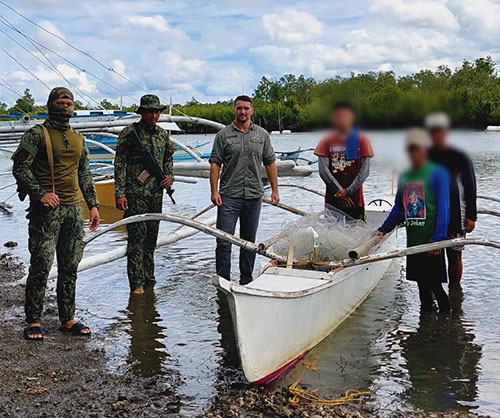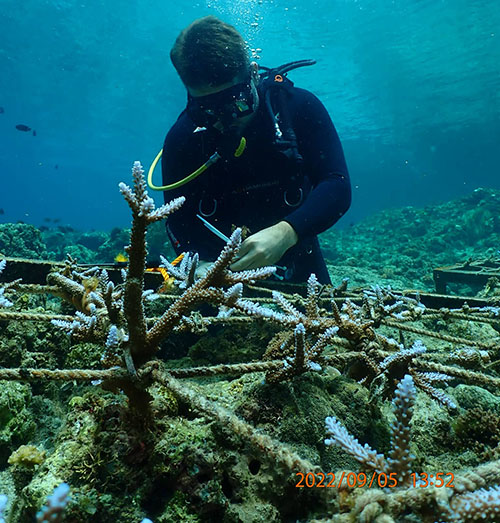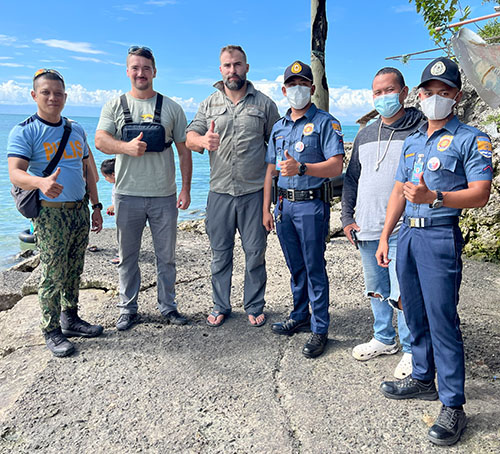
23 May 2023 – The Philippines have a key position in terms
of biodiversity. They are characterized by a high degree of endemism and are
located in the Coral Triangle ecoregion, which is often called the “Amazon of
the Sea” because of their ecological importance.
Due to climate change, population growth and destructive
fishing methods, especially by small-scale fishermen, their biodiversity is
critically endangered. Scientists have predicted that the global extinction of
wild seafood may occur in 2048. Czech conservationists led by Kukang Rescue
Program’s director and Ostrava Zoo field worker František Příbrský, Tomáš Ouhel
from NGO Lestari and Liberec Zoo, and Lucie Čižmářová from the Kukang Program
and Olomouc Zoo with their teams, who are intensively devoted to the issue,
point out that this catastrophe may occur in the Philippines much earlier.
Together with the non-profit organization Vesna Panglao
Conservation and with the support of the Embassy of the Czech Republic in
Manila, they managed to establish cooperation with the Philippine National
Police - Maritime Group, with whom they conducted several successful raids
around the islands of Bohol and Cebu against smaller fishermen using
destructive fishing techniques such as poisons, explosives or trawls. The
Czechs want to help improve access to biodiversity protection in the
Philippines, but they also call on tourists to be more responsible.
Globally, 11-26 million tons of fish are illegally caught
every year, and scientists have calculated that if this trend continues, wild
seafood will be wiped out by 2048. But in the Philippines, where small-scale
community fisheries play a key role and even dominate commercial fisheries1, it
may be much earlier. The Philippines are facing the largest population growth
in the entire Southeast Asia2 with an average annual fish consumption of 36 kg
per 1 inhabitant. At the same time, the global average fish consumption is 22
kilograms, which points to the Philippines’ dependence on fish. In addition,
the Philippines rank among medium-developed societies that may have a greater
negative impact on marine ecosystems than both developed and underdeveloped
societies. Underdeveloped societies often operate traditional, low-volume
fisheries that have a less negative impact on the marine environment and
resources.
Highly developed societies, on the other hand, have access
to more sophisticated technologies and management practices that can reduce the
impact of fishing on marine ecosystems3. “Fishing in the Philippines is not
highly regulated and difficult enforcement of regulations makes it difficult to
implement sustainable fishing practices. Illegal and devastating practices such
as dynamite and cyanide fishing are common in the archipelago4. These practices
destroy entire coral reefs, kill entire fish populations, including non-target
animal species, which we call by-catch,” explains Tomáš Ouhel, adviser for
nature protection and research at the Liberec Zoo.
In the past year, this team of conservationists managed to
accomplish several successful raids in the region when they helped capture and
arrest Greed, a key member of an Indonesian smuggling gang that was trading in
orangutans, gibbons, slow lorises and other endangered species. They followed
up on this international success by catching a group of hunters of the
critically endangered Nias Hill Mynas. Currently, they are also intensively
devoted to the issue of illegal fishing and the protection of biodiversity in
the Philippines. “In order to ensure the long-term health of marine ecosystems,
it is essential to implement sustainable fishing practices, implement closures
of selected areas, monitor them and enforce strict regulations. These measures
can also bring food security to coastal communities in the more than 7,000
Philippine islands that depend on fishing,” stated František Příbrský,
coordinator of conservation projects at the Ostrava Zoo and director of The
Kukang Rescue Program, adding that exposing and combating illegal hunting and
trade in endangered species is a new important activity of the Kukang program.
You can watch a video depicting the cooperation of the Czech conservationist
and the national maritime police PNP Maritime Group in the Philippines here.
“In the field of nature conservation, the national maritime police Maritime
Group Bohol has been cooperating with the Vesna Panglao Conservation
organization for several years, and we are glad that we now have the
opportunity to also use the partnership of zoologists Příbrský and Ouhel. Czech
conservationists help us set up an effective strategy to protect marine
biodiversity from illegal fishermen, but they also participate in so-called
simex (simulation exercises) or provide us with tracking equipment such as
drones and satellite phones that effectively monitor activities in the marine
waters of Bohol province,” summarized the activities PCPT Stephen C Boniba,
station chief of Maritime Group Bohol.
Let’s not be indifferent
Czech conservationists with their teams want to raise public
awareness about responsible tourism, unsustainable fishing in the Philippines
or the archipelago’s climate problems, which are behind the approaching
ecological disaster. At the same time, they want to encourage society to take a
responsible approach. Therefore, in cooperation with Vesna Panglao
Conservation, they have compiled a set of advice and tips for everyone who is
not indifferent to the fate of our planet. The infographic can be downloaded
here.
The Ostrava Zoo, the main partner of the Kukang Program,
also offers an opportunity to help Philippine biodiversity. The zoo dedicates
its annual charity run www.behzooostrava.cz to the non-profit organization
Vesna Panglao Conservation, which focuses on the protection and restoration of
the destroyed coral reef in the Philippines and the education of local
communities. Apart from the Ostrava Zoo (František Příbrský), the project to
save biodiversity in the Philippines is also supported by the Liberec Zoo
(Tomáš Ouhel), the Olomouc Zoo (Lucie Čižmářová) and the Ústí nad Labem Zoo
(František Příbrský).



Photo Credits: archive of Vesna Panglao Conservation
Contact for media:
#Jdetozachranit
Public Relations
Kateřina Podhorská
E-mail: jdetozachranit@gmail.com
Tel.: +420777618026
Sources of information:
1Philippines: total production volume of fishing 2021 |
Statista. Statista - The Statistics Portal for Market Data, Market Research and
Market Studies [online]. Copyright © Statista 2023 [cit. 01.05.2023]. Dostupné
z:
https://www.statista.com/statistics/975932/fisheries-fishing-production-volume-philippines/
2Population growth in South East Asia |
TheGlobalEconomy.com. Global economy, world economy | TheGlobalEconomy.com
[online]. Dostupné z:
https://www.theglobaleconomy.com/rankings/population_growth/South-East-Asia/
3Halpern, B. S., Longo, C., Hardy, D., McLeod, K. L.,
Samhouri, J. F., Katona, S. K., ... & Zeller, D. (2014). An index to assess
the health and benefits of the global ocean. Nature, 508(7495), 215-221
4Phillipines in: Asia-Pacific Journal of Ocean Law and
Policy Volume 4 Issue 1 (2019) . Brill | Over three centuries of scholarly
publishing [online]. Copyright © 2016 [cit. 01.05.2023]. Dostupné z:
https://brill.com/view/journals/apoc/4/1/article-p97_97.xml
Kateřina Holubová
Chair and spokeswoman
The Kukang Rescue Program, z.s.
Phone: +420 777 153 133
E-mail: holubova@kukang.org